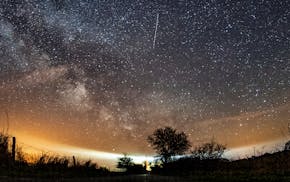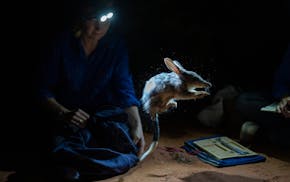Feel like earning a little extra money and maybe improving your health at the same time?
Consumers will soon be able to sell or rent their DNA to scientists who are trying to fight diseases as different as dementia, lupus and leukemia. Bio-brokers want to collect everything from 23andMe and Ancestry.com data to fully sequenced genomes.
The data would be sold or rented to biomedical institutes, universities and pharmaceutical companies, generating money for consumers who share their genetic secrets.
The roundup is mostly led by Luna DNA of Solana Beach and Nebula Genomics of San Francisco, startups that are still figuring out how much a person would be paid for their contribution. It's part of the booming bio-economy, where so-called "sequencing subsidies" are starting to emerge.
Scientists say they need enormous amounts of genetic data from across different ethnic, racial and age groups, and different genders, to develop diagnostics and drugs. The need for new and better therapeutics is deep and broad.
Most people never develop a genetic disorder. But single genes are responsible for causing more than 6,000 human diseases, including cystic fibrosis and muscular dystrophy. There are also many diseases influenced by multiple genes, notably obesity and type 2 diabetes.
Luna DNA is asking people to share data that they've gotten from such direct-to-consumer personal genomics companies as 23andMe and Ancestry.com.
Nebula Genomics wants people to contribute their entire genome, and is prepared to help consumers get sequenced at reduced costs. The consumer could then sell or rent the data on Nebula's data exchange. Consumers would be paid in some form of cryptocurrency that could be converted to dollars.
The bio-brokers sense that a grand opportunity is at hand.
The cost of sequencing a person's genome has fallen dramatically over the past 15 years and now stands at about $1,000. The price could drop to $100 within three years.
Scientists also are benefiting from the invention of CRISPR, a quick, easy and accurate way to modify DNA for therapeutic purposes.
"Thanks to continuous technological advancement, we have now reached a tipping point where the genomics revolution will spread beyond academic laboratories and affect the lives of millions of people," said Dennis Grishin, co-founder of Nebula Genomics. "Genomics will become an integral part of personal healthcare. Pharma companies will be buying large genomic data sets and using them to develop new drugs."
The medical, financial, legal and ethical implications will be daunting. Scientists at UC San Diego, the Scripps Translational Science Institute in La Jolla, Nebula Genomics and Luna DNA explain some key issues.
Q: What kind of data are scientists seeking from consumers?
A: We all have the same genes. But there's variation in those genes. Some "variants" are neutral; they determine things like our hair color and height. Some protect us from illness. And some variants can make us susceptible to disease. We call those mutations.
Scientists are largely interested in the mutations because they can cause diseases and disorders. 23andMe tests the DNA in your saliva for more than 500,000 variants. The FDA has given the company permission to screen people for genes associated with 10 diseases and disorders, including Huntington's disease and late-onset Alzheimer's disease, and three genes associated with cancer.
The company uses this data to estimate a person's disease risk. It is not a diagnosis; it is risk analysis based on an incomplete understanding of genetics.
"Tests like Ancestry and 23andMe only look at small areas of the genome, and aren't considered to be useful tests for medical care by most genetics experts," said Lisa Madlensky, director of the Family Cancer Genetics Program at UC San Diego. "However, they can sometimes identify something medically important that needs to be confirmed" with medical tests.
Q: If I take one of these tests, do I own the data that's generated?
A: Generally speaking, yes. But you have to read the fine print. You should make sure that you say no if you don't want a company like 23andMe selling your data to a pharmaceutical company or some other institution.
Q: How is Nebula Genomics different?
A: The test used by 23andMe offers a limited look at a person's genes. Nebula wants to get a complete look. So they're asking consumers to undergo so-called whole genome sequencing, which maps a person's entire genetic makeup. Such data is widely used by biomedical researchers. And this kind of sequencing is moving into clinical settings. For example, this test is used to sequence bacteria, which helps hospitals fight infection.
Q: There are many types of tests. How accurate are they?
A: Mistakes can be made in every type of testing. And it can be difficult to determine overall accuracy, especially with direct-to-consumer DNA tests that involve ethnicity and genealogy.
Q: Should I be worried about the privacy of my data?
A: Barry said, "An individual's data contains no personal identifiers and is combined with the broad population to create the scale and scope necessary to drive medical discoveries." You hear similar things from other companies, and from the government. Keep in mind that hackers have stolen data from everyone from the National Security Agency to hospitals.
Q: Is it likely that a consumer could make a significant amount of money?
A: The companies are startups. Dawn Barry, president of Luna DNA, said, "Individuals will be rewarded when proceeds are generated through the sale of access to the data."

The Lyrid meteor shower peaks this weekend, but it may be hard to see it

Legislation that could force a TikTok ban revived as part of House foreign aid package
![Cattle at the Wysocki Dairy CAFO (concentrated animal feeding operation) in Armenia, Wisc. in late October. ] Aaron Lavinsky • aaron.lavinsky@s](https://arc.stimg.co/startribunemedia/GNUPD5JDUEDREIFU5RKJM2EV2Y.jpg?h=91&w=145&fit=crop&bg=999&crop=faces)
Iowa environmental groups ask EPA to step in and protect drinking water

Why you should donate clothing: It (probably) won't end up at the dump

